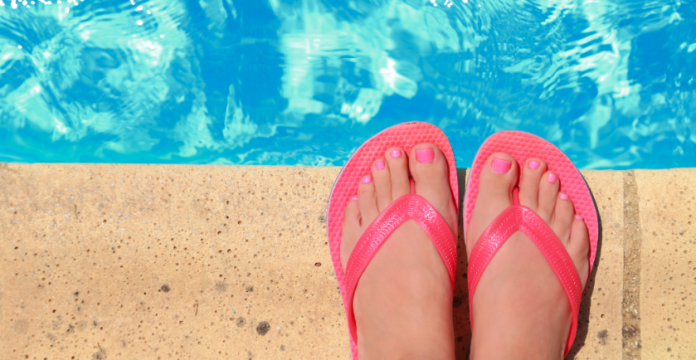
Flip flops are as common in the summer as barbecue and beach days-but they might be harming our health. The stripped-down sandals offer little in terms of support, and it turns out they might even be harboring bacteria.
Meredith Leigh Ward, a podiatrist at St. Francis Hospital and Medical Center in Hartford, told Women's Health flip flops can be a bacterial breeding ground. “Pseudomonas is a water-loving bacteria which can cause infections in and around pools. Staph infections are common skin infections, and staph bacteria can live on the material of the flip flops.”
Common flip flop materials like rubber and plastic are especially prone to bacteria. Flip flops can often cause blisters, and blisters plus bacteria can mean bad news if the bacteria turns into an infection.
A 2010 study found that flip flops decrease the load on our knees, but Ward says the sandals can lead to other types of joint pain like plantar fasciitis. Approximately 2 million Americans suffer from plantar fasciitis each year, which occurs when the ligament between the toes and heel is stretched or torn from a lack of support.
Read more about healing heel pain
“Your feet are the building blocks for how your ankles, knees, hips, back, and shoulders are aligned,” says Ward. Flip flops offer no support, which can affect posture and alignment throughout the body. Poor posture can lead to joint pain and inflammation. Podiatrist Greg Cohen, DPM, from Long Island College Hospital in Brooklyn, NY, told Forbes, “Flip-flops don’t really hold on the foot like most shoes do, so we use the tendons and muscles to hold them on.” This can also lead to strains and sprains, along with foot pain.
Read more about good posture and your health
When it comes to summer footwear, it's important to keep the following things in mind:
- Wear flip flops at the right time. Save them for the pool or cottage, not an afternoon hike.
- Try to select sandals with multiple straps.
- Replace cheaper flip flops every quarter.
- Don't forget the sunscreen if your feet are exposed.
- Keeping feet clean and dry is the key to keeping bacteria at bay.
- Stick your flip flops in the freezer overnight to kill the bacteria or spray them with vinegar and water.










